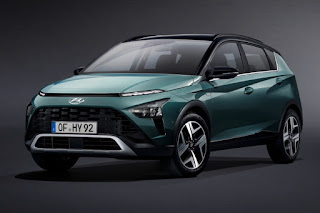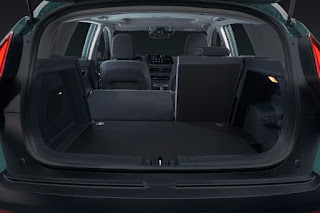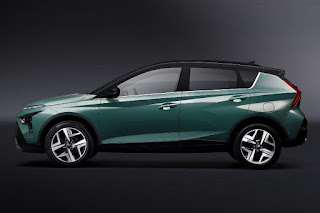Hyundai launches the Bayon crossover SUV
Hyundai is adding another B-segment SUV to its European range. The new Bayon – which measures 4,180 mm (13’ 9”) long – joins the slightly larger 4,205 mm (13’ 10”) Kona.
The two models seem to overlap rather a lot, but according to Hyundai the Bayon focusses more on providing better interior space. Indeed, the Bayon has 411 litres of luggage capacity with the rear seats up, while the corresponding Kona figure is 374 litres.
Thanks to a large front grille, intricate side surfacing, arrow-shaped rear light clusters and an optional Phantom Black roof finish, the Bayon manages to look distinctive. Depending on trim grade, wheels are 15” steel, 16” alloy or 17” alloy.
Power comes from the 1.0 litre Kappa T-GDi turbocharged petrol engine that incorporates a 48V mild hybrid system. This three-cylinder unit is being offered with either 100 PS (98 bhp / 73 kW) or 120 PS (118 bhp / 88 kW).
Both versions produce up to 171 Nm (126 lb-ft) of peak torque, and they can be mated to either a six-speed ‘intelligent’ manual transmission (iMT) or a seven-speed dual-clutch automatic transmission. iMT disengages the engine from the gearbox as soon as the accelerator is released, in order to coast and save fuel.
Semi-autonomous driving is going to be possible, as part of the SmartSense suite of safety technologies. Available features include Lane Keeping Assist, Lane Following Assist, Intelligent Speed Limit Assist, Blind-Spot Collision Warning and Forward Collision-Avoidance Assist with Junction Turning.
Hyundai has yet to confirm Bayon prices, but how they compare to the Kona’s will surely influence how customers choose between them. Similarly, the Bayon’s on-sale date remains unknown.
Related posts:
Hyundai Kona Electric updated for 2021
Hyundai reveals the fourth-generation Tuscon
A major mid-life refresh for Hyundai’s Santa Fe
The two models seem to overlap rather a lot, but according to Hyundai the Bayon focusses more on providing better interior space. Indeed, the Bayon has 411 litres of luggage capacity with the rear seats up, while the corresponding Kona figure is 374 litres.
Thanks to a large front grille, intricate side surfacing, arrow-shaped rear light clusters and an optional Phantom Black roof finish, the Bayon manages to look distinctive. Depending on trim grade, wheels are 15” steel, 16” alloy or 17” alloy.
Power comes from the 1.0 litre Kappa T-GDi turbocharged petrol engine that incorporates a 48V mild hybrid system. This three-cylinder unit is being offered with either 100 PS (98 bhp / 73 kW) or 120 PS (118 bhp / 88 kW).
Both versions produce up to 171 Nm (126 lb-ft) of peak torque, and they can be mated to either a six-speed ‘intelligent’ manual transmission (iMT) or a seven-speed dual-clutch automatic transmission. iMT disengages the engine from the gearbox as soon as the accelerator is released, in order to coast and save fuel.
Semi-autonomous driving is going to be possible, as part of the SmartSense suite of safety technologies. Available features include Lane Keeping Assist, Lane Following Assist, Intelligent Speed Limit Assist, Blind-Spot Collision Warning and Forward Collision-Avoidance Assist with Junction Turning.
Hyundai has yet to confirm Bayon prices, but how they compare to the Kona’s will surely influence how customers choose between them. Similarly, the Bayon’s on-sale date remains unknown.
Related posts:
Hyundai Kona Electric updated for 2021
Hyundai reveals the fourth-generation Tuscon
A major mid-life refresh for Hyundai’s Santa Fe









%2BDashboard.jpg)

+Front+Side.jpg)

+Front+Side.jpg)

Comments
Post a Comment